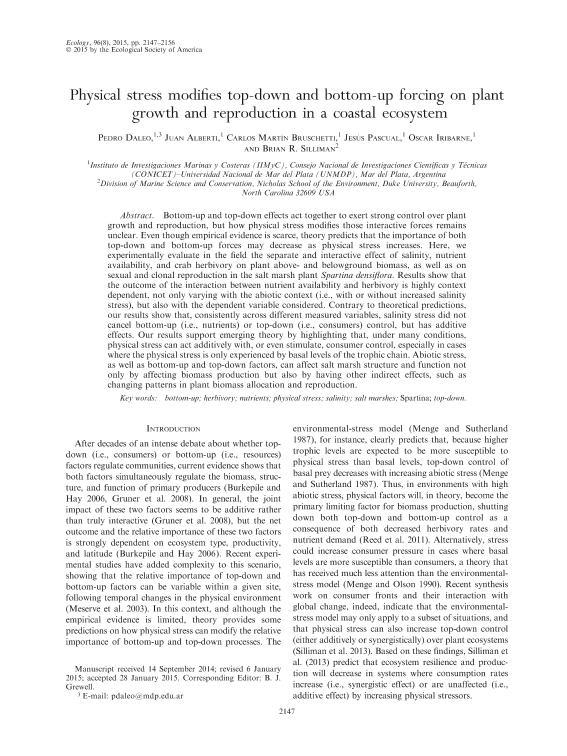Mostrar el registro sencillo del ítem
dc.contributor.author
Daleo, Pedro

dc.contributor.author
Alberti, Juan

dc.contributor.author
Bruschetti, Carlos Martin

dc.contributor.author
Pascual, Jesus Maria

dc.contributor.author
Iribarne, Oscar Osvaldo

dc.contributor.author
Silliman, Brian Red

dc.date.available
2018-03-07T20:24:13Z
dc.date.issued
2015-08
dc.identifier.citation
Daleo, Pedro; Alberti, Juan; Bruschetti, Carlos Martin; Pascual, Jesus Maria; Iribarne, Oscar Osvaldo; et al.; Physical stress modifies top-down and bottom-up forcing on plant growth and reproduction in a coastal ecosystem; Ecological Society of America; Ecology; 96; 8; 8-2015; 2147-2156
dc.identifier.issn
0012-9658
dc.identifier.uri
http://hdl.handle.net/11336/38197
dc.description.abstract
Bottom-up and top-down effects act together to exert strong control over plant growth and reproduction, but how physical stress modifies those interactive forces remains unclear. Even though empirical evidence is scarce, theory predicts that the importance of both top-down and bottom-up forces may decrease as physical stress increases. Here, we experimentally evaluate in the field the separate and interactive effect of salinity, nutrient availability, and crab herbivory on plant above- And belowground biomass, as well as on sexual and clonal reproduction in the salt marsh plant Spartina densiflora. Results show that the outcome of the interaction between nutrient availability and herbivory is highly context dependent, not only varying with the abiotic context (i.e., with or without increased salinity stress), but also with the dependent variable considered. Contrary to theoretical predictions, our results show that, consistently across different measured variables, salinity stress did not cancel bottom-up (i.e., nutrients) or top-down (i.e., consumers) control, but has additive effects. Our results support emerging theory by highlighting that, under many conditions, physical stress can act additively with, or even stimulate, consumer control, especially in cases where the physical stress is only experienced by basal levels of the trophic chain. Abiotic stress, as well as bottom-up and top-down factors, can affect salt marsh structure and function not only by affecting biomass production but also by having other indirect effects, such as changing patterns in plant biomass allocation and reproduction.
dc.format
application/pdf
dc.language.iso
eng
dc.publisher
Ecological Society of America

dc.rights
info:eu-repo/semantics/openAccess
dc.rights.uri
https://creativecommons.org/licenses/by-nc-sa/2.5/ar/
dc.subject
Bottom-Up
dc.subject
Herbivory
dc.subject
Nutrients
dc.subject
Physical Stress
dc.subject
Salinity
dc.subject
Salt Marshes
dc.subject
Spartina
dc.subject
Top-Down
dc.subject.classification
Otras Ciencias Biológicas

dc.subject.classification
Ciencias Biológicas

dc.subject.classification
CIENCIAS NATURALES Y EXACTAS

dc.title
Physical stress modifies top-down and bottom-up forcing on plant growth and reproduction in a coastal ecosystem
dc.type
info:eu-repo/semantics/article
dc.type
info:ar-repo/semantics/artículo
dc.type
info:eu-repo/semantics/publishedVersion
dc.date.updated
2018-03-02T14:01:46Z
dc.journal.volume
96
dc.journal.number
8
dc.journal.pagination
2147-2156
dc.journal.pais
Estados Unidos

dc.description.fil
Fil: Daleo, Pedro. Consejo Nacional de Investigaciones Científicas y Técnicas. Centro Científico Tecnológico Conicet - Mar del Plata. Instituto de Investigaciones Marinas y Costeras. Universidad Nacional de Mar del Plata. Facultad de Ciencia Exactas y Naturales. Instituto de Investigaciones Marinas y Costeras; Argentina
dc.description.fil
Fil: Alberti, Juan. Consejo Nacional de Investigaciones Científicas y Técnicas. Centro Científico Tecnológico Conicet - Mar del Plata. Instituto de Investigaciones Marinas y Costeras. Universidad Nacional de Mar del Plata. Facultad de Ciencia Exactas y Naturales. Instituto de Investigaciones Marinas y Costeras; Argentina
dc.description.fil
Fil: Bruschetti, Carlos Martin. Consejo Nacional de Investigaciones Científicas y Técnicas. Centro Científico Tecnológico Conicet - Mar del Plata. Instituto de Investigaciones Marinas y Costeras. Universidad Nacional de Mar del Plata. Facultad de Ciencia Exactas y Naturales. Instituto de Investigaciones Marinas y Costeras; Argentina
dc.description.fil
Fil: Pascual, Jesus Maria. Consejo Nacional de Investigaciones Científicas y Técnicas. Centro Científico Tecnológico Conicet - Mar del Plata. Instituto de Investigaciones Marinas y Costeras. Universidad Nacional de Mar del Plata. Facultad de Ciencia Exactas y Naturales. Instituto de Investigaciones Marinas y Costeras; Argentina
dc.description.fil
Fil: Iribarne, Oscar Osvaldo. Consejo Nacional de Investigaciones Científicas y Técnicas. Centro Científico Tecnológico Conicet - Mar del Plata. Instituto de Investigaciones Marinas y Costeras. Universidad Nacional de Mar del Plata. Facultad de Ciencia Exactas y Naturales. Instituto de Investigaciones Marinas y Costeras; Argentina
dc.description.fil
Fil: Silliman, Brian Red. University of Duke; Estados Unidos
dc.journal.title
Ecology

dc.relation.alternativeid
info:eu-repo/semantics/altIdentifier/doi/http://dx.doi.org/10.1890/14-1776.1
dc.relation.alternativeid
info:eu-repo/semantics/altIdentifier/url/http://onlinelibrary.wiley.com/doi/10.1890/14-1776.1/abstract
Archivos asociados
